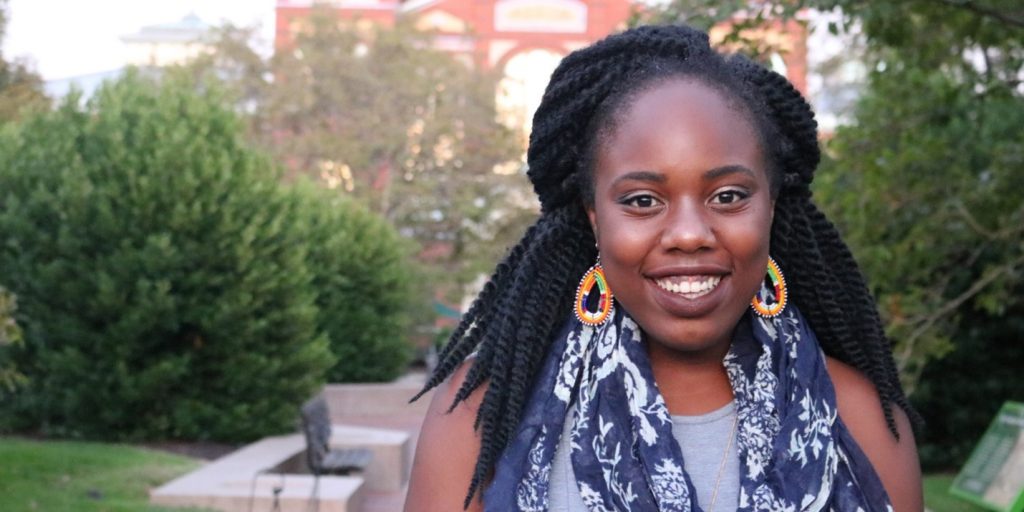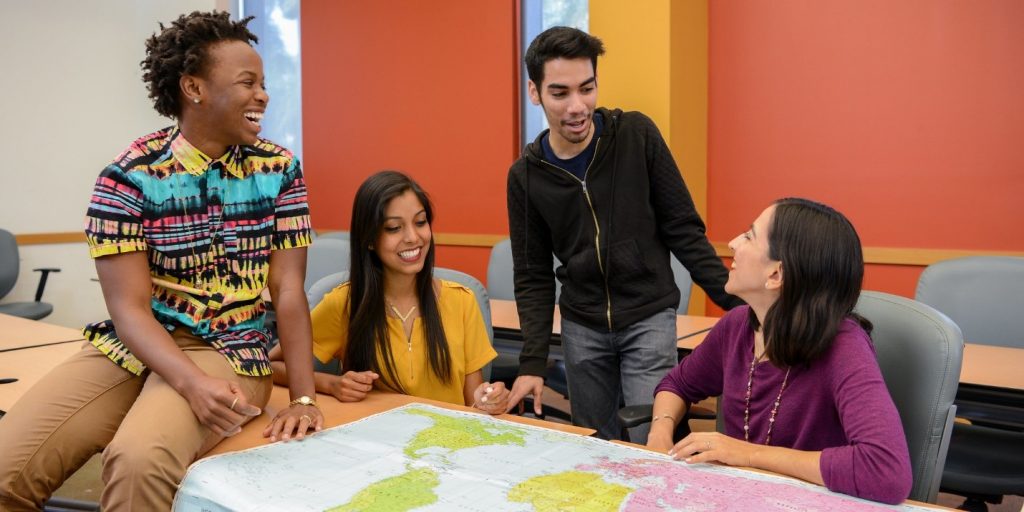September 9, 2020
Touted for their role in infusing international perspectives into the U.S. college experience, global leadership programs are now an important tool to keep internationalization at the forefront as travel remains limited.
In the era of the novel coronavirus pandemic, global leadership programs seem to have even greater relevance.
Born in London and raised in Florida by Nigerian parents, Chizoba Ezenwa developed an interest in exploring other cultures and languages at a young age. By the time she was in middle school, Ezenwa’s family took annual summer trips to Nigeria, where she visited extended family and learned more about her heritage. She made solo trips to Nigeria during high school summer breaks, dedicating time during these visits to volunteer in a rehabilitation center for orphans, young mothers, and people with mental health issues.
These early experiences sparked Ezenwa’s interest in a globalized education. As a student at the University of Florida (UF), she completed the International Scholars Program (ISP) to augment her major in international studies with a concentration in Africa. She also completed a minor in international development and humanitarian assistance.
“[These travels to Nigeria] are a part of the story about what guided me toward pursuing an international degree,” says Ezenwa, who graduated in 2017 and returned to the United States in December after serving 2 years as a Peace Corps volunteer in Benin, West Africa.
“I threw myself into the international realm [at UF],” she says. “As a result, I discovered mentors and professors who, like me, are fascinated by the world, and particularly by Africa and its potential.”
Global leadership programs such as ISP at UF have been a boost for campus internationalization efforts. In the era of the novel coronavirus pandemic, they seem to have even greater relevance. These initiatives—many of which do not require an overseas experience—keep intercultural learning goals top of mind at a time when travel is restricted, education abroad programs are canceled, and budget cuts loom for many international offices.
‘An Added Advantage’ in the Current Moment—and Beyond
Global leadership programs may not only help international education professionals prove their worth on campus during uncertain times, but they also provide a launchpad for new offerings to meet present (and likely future) circumstances.
“The pandemic has forced us to reimagine internationalization without mobility,” says Paloma Rodríguez, MA, director of the Office of Global Learning at the University of Florida International Center. “It has exposed our overreliance on mobility as an educational experience, and it has allowed us to experiment with other forms of learning, such as virtual exchange, which are more environmentally sustainable and equitable in terms of access.”
“The pandemic has forced us to reimagine internationalization without mobility.” —Paloma Rodríguez
Global leadership and similar programs, says Rodríguez, “are very well suited for the current environment. [They] were conceived and implemented with the understanding that global learning occurs in a variety of contexts, including on-campus curricular and co-curricular settings,” she says. “These programs have always had an integrative approach to learning and have considered mobility to be one part of a very complex whole.”
U.S. higher education, viewed throughout the world as a model of excellence, plays an essential role in preparing the future workforce to be nimble and adaptable in the constantly changing global marketplace. From that perspective, international education is an essential component of a high-quality academic experience.
According to USA StudyAbroad, international experiences help students “build skills and knowledge, prepare to solve the world’s toughest challenges, and compete in the 21st century workforce.” The Job Outlook 2018 survey by the National Association of Colleges and Employers (NACE) found that employers ranked global/multicultural fluency among the top eight desired competencies for prospective employees.

For students to develop the skills that set them apart to employers, global programs must be intentionally designed, says Paloma Rodríguez. Illustration: Shutterstock
“In a globalized job market, there is certainly a need for the kind of interpersonal and intercultural skills that can be developed during an experience abroad,” Rodríguez says. “As students have become more aware of these employability trends, they have started to see international programs as an added advantage.”
Reflecting on International Experiences Enhances Career Readiness
That’s not to say that a learning abroad experience alone translates into employability. In fact, Rodríguez says, research shows that simply listing a study abroad program on a résumé does not significantly increase a student’s chances of landing a job.
“If we want to strengthen student employability through study abroad…the experience needs to be designed to foster the development of the targeted skills: independence, openness, initiative, leadership, self-reliance,” Rodríguez says. “Students need to be able to articulate the skills they have gained in a way that is relevant and intelligible to employers.”

The International Scholars Program at the University of Florida gave Chiboza Enzenwa a way to deepen her interest in international studies and prepare for postgraduate life as a Peace Corps Volunteer and new employee at the U.S. Department of Agriculture’s Foreign Agricultural Service. Photo: Courtesy Chiboza Enzenwa
That is why reflection is a critical component of global certificate programs. For example, in their final project, ISP students at UF must create an ePortfolio comprising pictures, blog posts, research papers, résumés, and other documents that summarize and demonstrate the overall value of the international experiences they engaged in, whether abroad or at home: internationally focused courses, on-campus international events, foreign language classes, and international experiences.
For Ezenwa, the ePortfolio is a “living document” that she can continue to update. The exercise of reflection allows her to consider the many ways her international experiences enriched her life—and, ultimately, helped her successfully interview for and land her new job with the U.S. Department of Agriculture’s Foreign Agricultural Service.
“The ePortfolio as a physical demonstration of our experiences was really attractive to me,” says Ezenwa, who also completed UF’s Peace Corps Prep program. “It allowed me to think more critically about my ‘why.’ Why [did I want] to go abroad for 2 years? Both the International Scholars Program and the Peace Corps Prep program gave me that opportunity to reflect on my life—on my present and where I wanted to go moving forward.”
Boosting Global Engagement Across Campus
Whatever form they take, global leadership programs help reinforce an international focus across campus. At Florida International University (FIU), the campuswide Global Learning for Global Citizenship initiative was launched in 2010. At its heart, this initiative is a two-course global learning requirement for all undergraduates, and the more than 250 global learning courses that fulfill this requirement are found in every academic department. Students also participate in co-curricular activities to extend and enrich classroom global learning.
The initiative grew out of an institution-wide effort “to reinvigorate the ‘I’ in FIU,” explains Hilary Landorf, PhD, executive director of the Office of Global Learning Initiatives at FIU and associate professor of international and intercultural education. (Editor’s note: Read Making Global Learning Universal, the book Landorf co-authored about FIU’s global initiative.)
FIU’s review of all undergraduate program self-study reports had revealed an “internationalization gap”—a discrepancy between the high value stakeholders placed on diversity at FIU and the extent to which diverse perspectives were cultivated in the classroom. After 2 years of planning, the Global Learning for Global Citizenship initiative was implemented in 2010 to close the gap.
FIU students wanting to take global learning a step further may enroll in the Global Learning Medallion program, which recognizes students who take at least four global learning courses, participate in a variety of global co-curricular activities, complete a capstone, and create an electronic portfolio to reflect on their learning.

Students who are part of FIU’s Global Learning Medallion program go beyond the institution’s global learning requirement for all undergraduates to “plant deep global learning roots and thrive as global citizens,” says Hilary Landorf.
“The distinct value of the Global Learning Medallion at FIU is to give students who were passionate about integrating their in-class global learning with co-curricular and personal global learning experiences the opportunity to do so,” Landorf says. “The goal of the Global Learning Medallion is to give students a pathway to collaborate with diverse others and in multiple environments where they can plant deep global learning roots and thrive as global citizens.”
Bringing the World to Campus
Jobs, finances, or family circumstances may prevent students from participating in overseas programs. But many global leadership programs offer enriching experiences on campus or within the local communities.
At the University of North Carolina-Charlotte (UNCC), students in the Global Engagement Scholars Program (GESP) must complete a four-credit academic course, a co-curricular elective, and a longer international engagement experience. While a study abroad program can satisfy the international engagement component, students may elect to do a globally focused internship or volunteer experience in Charlotte, or live in one of the two globally focused residence programs on campus.
“Without the mobility option, programs such as the GESP are ways for students to engage globally on campus and meet like-minded students,” says Joseph Hoff, PhD, director of the Global Education and Engagement Office in the Office of International Programs at UNCC. “We hope the program will grow since it doesn’t have the mobility requirement.”
Because community colleges fill a specialized role in workforce preparation, Harper College, located in the Chicago suburbs, established its Global Scholar Distinction (GSD) to expose students to the global job market.
In addition to completing at least 12 hours of interdisciplinary coursework, Harper students in the GSD program must complete a capstone project with an international component. These projects vary with student personalities and interests, but recent examples include a survey about cultural attitudes toward happiness and success; an exploration of culturally sensitive signage on campus; and a hypothetical renaming of campus buildings according to geographical and intercultural parameters.
“The world that these students are going to head out into is radically different than the world generations before them graduated into,” says Richard Johnson, PhD, director of the college’s Office of International Education.
“It is increasingly interconnected and marked by a significant interdependence that is rapidly changing,” he says. “Our students must be equipped with the intercultural knowledge, skills, and attitudes to function efficiently, productively, and successfully in that environment. It’s our responsibility [as community college educators] to prepare them to go out into that workforce or to transfer to four-year schools.”

Global programs that do not include a mobility component are especially relevant in the COVID-19 era, as experts do not know when mobility will resume to pre-pandemic levels. Illustration: Shutterstock
The Certificate in International Higher Education offered by the Center for International Higher Education (CIHE) at Boston College’s Lynch School of Education and Human Development aims to boost students’ career prospects in the field of international education and scholarship. The certificate, which may be completed from a distance, guides students in exploring issues such as leadership and management, economics and finance, student affairs, and teaching and learning from a global angle—unlike many programs around the world taught from the host country’s perspective, explains Rebecca Schendel, PhD, CIHE’s associate director.
The credits students earn from completing four courses and a field experience may be applied to the Lynch School’s master of arts in international education degree requirements.
“In our program, we try whenever possible to build upon the professional experiences and expertise of our certificate students,” Schendel says. “[We work] to ensure that the coursework is of direct relevance to their daily jobs, while also offering new avenues and opportunities for their futures.”
Finding Opportunities Despite Limited Mobility
With the coronavirus pandemic ushering in a new era of remote learning, many institutions have found opportunities to explore dynamic new curriculum and programming. At UF, efforts already underway to explore the value and potential of virtual exchange and Collaborative Online International Learning (COIL) were accelerated after the necessary transition to online learning in March.
For instance, one UF instructor developed a virtual exchange project around behavioral change with a faculty member at a Colombian institution. Students from both schools were mixed into teams and tasked with designing a plan to create behavioral change to enhance sustainable practices. The UF students had to design a workable plan for the Colombian campus, while the Colombian students had to create a plan for the UF campus.
“These opportunities have the benefit of being able to reach a far greater number of students than ever before because they entail no [additional] cost.” —Richard Johnson
“In solving the task, the students had to talk to each other, get feedback on the plan, incorporate the feedback into the proposal, [and more],” says Rodríguez. “Through the exercise, they had to learn how to overcome communication barriers and develop an understanding of the cultural and social conditions abroad to make their projects effective.”
Harper College has launched two video series since March to enhance teaching and learning in the COVID-19 era. The first, World Views: Curated Conversations on Global Education, features videotaped conversations with Harper faculty, staff, administrators, and international and U.S. students on the impact and importance of international education. The second, From Around the Globe: Global Education Video Series, provides on-site lectures by local experts on a variety of subjects. At this point, there are eight lectures that Harper’s biology faculty will use this fall.
“These opportunities have the benefit of being able to reach a far greater number of students than ever before because they entail no [additional] cost,” Johnson says. “They are integrated into curricula, and they are accessible remotely.…The pandemic has underscored just how interconnected we are, so any dynamic initiatives to infuse global perspectives and intercultural learning in our curricula are vital to the future success of our students and, not to be overly dramatic, the world.” •
